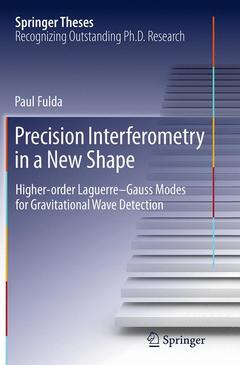Description
Precision Interferometry in a New Shape, Softcover reprint of the original 1st ed. 2014
Higher-order Laguerre-Gauss Modes for Gravitational Wave Detection
Springer Theses Series
Author: Fulda Paul
Language: English
Subject for Precision Interferometry in a New Shape:
Precision Interferometry in a New Shape
Publication date: 08-2016
Support: Print on demand
Publication date: 08-2016
Support: Print on demand
Precision Interferometry in a New Shape
Publication date: 09-2013
154 p. · 15.5x23.5 cm · Hardback
Publication date: 09-2013
154 p. · 15.5x23.5 cm · Hardback
Description
/li>Contents
/li>Biography
/li>Comment
/li>
With his Ph.D. thesis, presented here in the format of a "Springer Theses", Paul Fulda won the 2012 GWIC thesis prize awarded by the Gravitational Wave International Committee. The impact of thermal noise on future gravitational wave detectors depends on the size and shape of the interrogating laser beam. It had been known since 2006 that, in theory, higher-order Laguerre-Gauss modes could reduce thermal noise. Paul Fulda?s research brings Laguerre-Gauss modes an enormous step forward. His work includes analytical, numerical and experimental work on table-top setups as well as experiments at the Glasgow 10m prototype interferometer. Using numerical simulations the LG33 mode was selected as the optical mode to be tested. Further research by Paul and his colleagues since then concentrated on this mode. Paul has developed and demonstrated simple and effective methods to create this mode with diffractive optics and successfully demonstrated its compatibility with the essential building blocks of gravitational wave detectors, namely, optical cavities, Michelson interferometers and opto-electronic sensing and control systems. Through this work, Laguerre-Gauss modes for interferometers have been transformed from an essentially unknown entity to a well understood option with an experimental basis.
Introduction.- Laguerre-Gauss beams for test mass thermal noise reduction.- Simulation study into LG33 mode interferometry and production.- Tabletop demonstrations of LG mode production and cleaning.- Prototype experiments with the LG33 mode.- Summary and conclusions.- Bibliography.- Acknowledgments.
Dr. Paul Fulda received his PhD in 2012 at the University of Birmingham. He is the winner of the 2012 GWIC Thesis Prize awarded by the Gravitational Wave International Committee.
Nominated by Gravitational Wave International Committee (GWIC) as an outstanding Ph.D. thesis Winner of the 2012 GWIC Thesis Prize Presents a seminal work allowing to build gravitational wave detectors with reduced thermal noise Includes supplementary material: sn.pub/extras
© 2024 LAVOISIER S.A.S.




